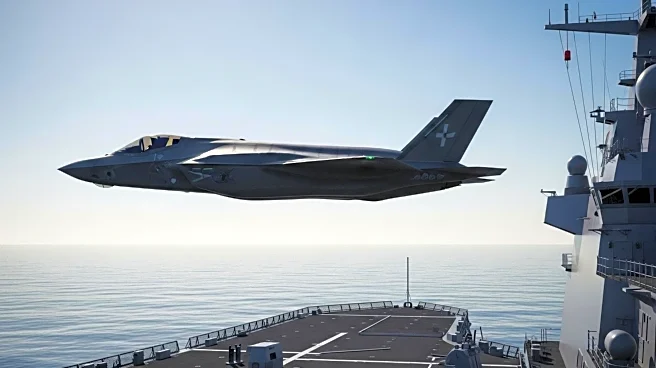What's Happening?
The UK Royal Navy is playing a significant role in Japan's efforts to deploy F-35B Lightning fighter aircraft on its Izumo-class carriers. Commodore James Blackmore, commander of the UK Carrier Strike Group 25 (CSG25), highlighted the collaboration during a trilateral exercise in the northern Philippine Sea. This exercise involved naval forces from Japan, the UK, and the US. On August 8, a UK-operated F-35B successfully landed on the flight deck of the Japan Maritime Self-Defense Force's (JMSDF) second Izumo-class helicopter carrier, JS Kaga. This marked the first operational landing of an F-35B on an Izumo-class carrier. The Izumo-class ships, originally designed as helicopter destroyers, have undergone significant upgrades to support F-35B operations, including expanded flight decks and heat-resistant coatings.
Why It's Important?
This development is significant as it enhances Japan's naval capabilities and strengthens military cooperation between Japan, the UK, and the US. The deployment of F-35Bs on Izumo-class carriers represents a strategic shift for Japan, allowing it to project air power more effectively in the region. This move is likely to influence regional security dynamics, particularly in the context of rising tensions in the Asia-Pacific region. The collaboration also underscores the UK's commitment to maintaining a presence in the Indo-Pacific, aligning with its broader defense strategy. For the US, this trilateral cooperation reinforces its alliances and military presence in a strategically vital area.
What's Next?
The successful landing of the F-35B on JS Kaga is expected to lead to further joint exercises and operational deployments involving the UK, Japan, and the US. These activities will likely focus on enhancing interoperability and readiness among the allied forces. Additionally, Japan may continue to upgrade its naval assets to fully integrate F-35B capabilities, potentially influencing its defense procurement and strategic planning. The ongoing collaboration could also prompt other regional powers to reassess their military strategies and alliances.









